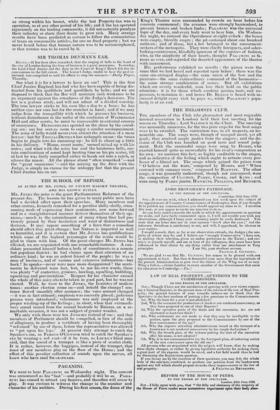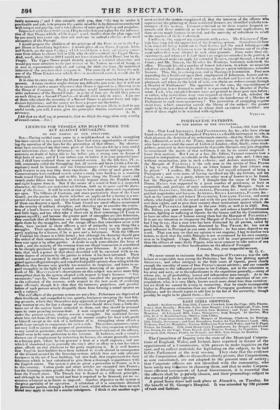REFORM OF THE HOUSE OF PEERS.
TO THE EDITOR OF TIIE SPECTATOR.
London, 201.11 June 1833.
Sirt—I fully agree with you, that "the folly and obstinacy of the majority of the House of Peers render some momentous experiment upon their body oboe.
hitely necessary ;" and also coincide With you that "the way to render it practicable and safe, is to prepare the public; wind for it, by discussions conducted With temper and gravity, and a tote.' absence of mere party feeling and prejudice. bripressed with these sentieemte, I beg to submit to you a plan for the reforma- tion of that House, which, while it goes natal further than the plan suggeetcd by you nearly two tears ago, does not embrace so radical a chnnee i.s the total abrogation of the Peerage. I would propose the abolition of the privilege of the Peers to sit in the Up- per 'louse as hereditary legislators. I would !dime all the Peers, Euglish.
atid Scotch, on the same footing ; which would for in a bode sur,:cieuily mime- rens from whom to choose 150 or 200, who should constitete the I 'err !louse. And, mark, those 150 or '200 I Ncfmlfl not have elitism Iry their Peers, but Iry the People. The Upper House would thereby acquire a national character, and would pay some attention to the just wishss of the Nation, instead of being, as it now is, representative only of, and caring for little else than, the individual interests of the members that compose it. The anomaly of its beiee the only one of the Three Estatee over which ths.,. is no effectual control, would also be destroyed. It is clear to every one, that the House of Peers cannot remain long as it is at psesent. A large creation might uhviate any difficulty just now, but it will not do to resort to such a means wheeever that I louse is upposed to aMinistry or to the House of Commons. Such a procedure would incontrovertiiily prove the Otter uselessness of the Second Estate : in pint of fret, we should then possess no such thing as a Second Chamber—it would exi.t only in name. I am one of those who admit the necessity of a Second House to prevent hasty and inju- dicious legislation ; and the sooner we have a proper into the better.
Should the observations that 1 have made appear to you likely to lead to any useful result, you will, I trust, give the principles thereiu contained your able • (All that we shall say at present is, that we think the suggestion very worthy oftonsideration.—En.)

















 Previous page
Previous page